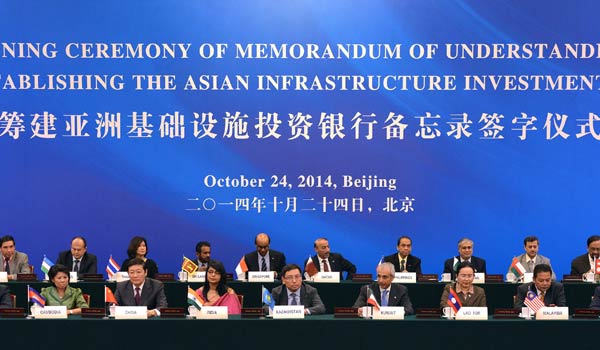 |
|
The signing ceremony of memorandum of understanding on establishing the Asian Infrastructure Investment Bank (AIIB) is held in Beijing, Oct 24 2014. [Photo/Xinhua] |
Over the past 25 years, with almost no notice or acclaim, more than 1 billion people lifted themselves out of extreme poverty, thanks in large part to governments that promoted economic growth and invested in people.
Today, fewer than 1 billion people remain in such difficult circumstances. We now have the opportunity to be the first human generation in history to end extreme poverty. It will not be easy and will take the coordinated efforts of many organizations, but it's entirely doable.
Still, the world needs more champions to fight poverty. That's why I warmly welcome the China-led Asian Infrastructure Investment Bank (AIIB).We believe the AIIB has great potential to help Asia build power plants, roads, bridges, schools, and clinics that will create jobs and boost economies.
When it comes to promoting development in low-and middle-income countries, there's no reason for institutions to be rivals. Indeed, there's more than enough work to go around to fight a common, old enemy: poverty.
Building new infrastructure will be critical. We are currently doing all we can now with our private sector arm, the International Finance Corporation, and through our public sector work, to support countries in identifying and then financing bankable infrastructure projects. The gap in infrastructure funding for developing countries remains enormous - estimated to be $1 trillion to $1.5 trillion a year - and any new funding source for roads, rail, seaports, airports, and other infrastructure should help the poor.
We are already working with the AIIB, sharing our expertise in laying the foundations for a new structure, just as we did for the European Bank for Reconstruction and Development. With strong environment, labor and procurement standards, the AIIB can become a powerful new force in development.
There's no doubt that the aspirations of leaders to promote development have grown in middle-and low-income countries. Many understandably want to accelerate their nation's ascent into middle-or high-income status.
At the World Bank Group, we firmly believe that establishing time-bound targets will help meet our objectives. We have set two goals: to end extreme poverty by 2030 and increase the incomes and wellbeing of the poorest 40 percent of people in developing countries.
To reach those targets, we now are collaborating with governments to create customized poverty reduction programs. These plans are based on analyses of a wide range of local factors, including demography and location of people living in extreme poverty. These plans also will highlight numerous types of investments that countries need to end extreme poverty and boost shared prosperity. Many of these projects will surely be led by our partners.
When I was in Jakarta, I met with country leaders, including President Joko Widodo, and was impressed with their vision to boost the economy and to fight poverty. I also learned much more about Indonesia's development needs, ranging from dealing with health crises (childhood stunting is estimated at 37 percent) to its infrastructure gap estimated at more than $600 billion in the next five years.
As part of my trip, I visited two ports - Sunda Kelapa Harbor and Tanjung Priok Port. Sunda Kelapa is an old port that accommodates two-masted wooden sailing ships and where laborers use their backs to lift tons of cargo into the hulls of the ships. Tanjung Priok, in contrast, is an industrialized port in which huge container cranes lift 20-foot containers onto the decks of modern freighters.
In this tale of two ports, it was clear that investing in Indonesia's port infrastructure could reap huge benefits for the economy. One port authority told me that if Indonesia can reduce its logistics costs from the current 24 percent of gross domestic product to 16 percent - the same as Thailand's - it can save an estimated $70 billion to $80 billion a year and attract more global manufacturers.
That's the core of our work: To help countries find solutions to their most vexing development challenges and build their economies. This will create jobs and boost the earnings of the poor. For Indonesia and the rest of Asia, more partners means more development. And more development means we can end extreme poverty.
The author is the president of the World Bank Group.

I’ve lived in China for quite a considerable time including my graduate school years, travelled and worked in a few cities and still choose my destination taking into consideration the density of smog or PM2.5 particulate matter in the region.